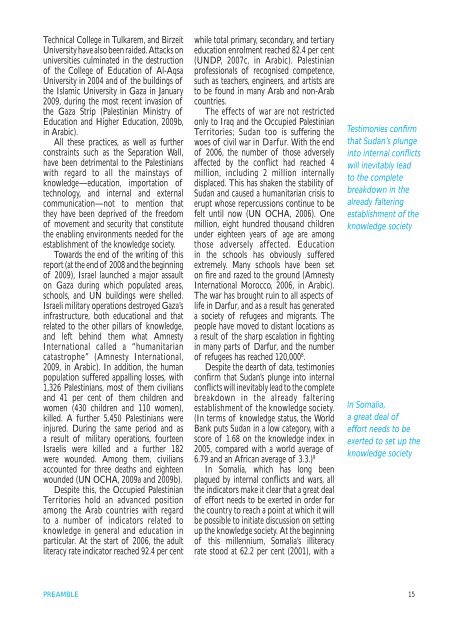Arab Knowledge Report 2009: Towards Productive
Arab Knowledge Report 2009: Towards Productive
Arab Knowledge Report 2009: Towards Productive
- No tags were found...
You also want an ePaper? Increase the reach of your titles
YUMPU automatically turns print PDFs into web optimized ePapers that Google loves.
Technical College in Tulkarem, and BirzeitUniversity have also been raided. Attacks onuniversities culminated in the destructionof the College of Education of Al-AqsaUniversity in 2004 and of the buildings ofthe Islamic University in Gaza in January<strong>2009</strong>, during the most recent invasion ofthe Gaza Strip (Palestinian Ministry ofEducation and Higher Education, <strong>2009</strong>b,in <strong>Arab</strong>ic).All these practices, as well as furtherconstraints such as the Separation Wall,have been detrimental to the Palestinianswith regard to all the mainstays ofknowledge—education, importation oftechnology, and internal and externalcommunication—not to mention thatthey have been deprived of the freedomof movement and security that constitutethe enabling environments needed for theestablishment of the knowledge society.<strong>Towards</strong> the end of the writing of thisreport (at the end of 2008 and the beginningof <strong>2009</strong>), Israel launched a major assaulton Gaza during which populated areas,schools, and UN buildings were shelled.Israeli military operations destroyed Gaza’sinfrastructure, both educational and thatrelated to the other pillars of knowledge,and left behind them what AmnestyInternational called a “humanitariancatastrophe” (Amnesty International,<strong>2009</strong>, in <strong>Arab</strong>ic). In addition, the humanpopulation suffered appalling losses, with1,326 Palestinians, most of them civiliansand 41 per cent of them children andwomen (430 children and 110 women),killed. A further 5,450 Palestinians wereinjured. During the same period and asa result of military operations, fourteenIsraelis were killed and a further 182were wounded. Among them, civiliansaccounted for three deaths and eighteenwounded (UN OCHA, <strong>2009</strong>a and <strong>2009</strong>b).Despite this, the Occupied PalestinianTerritories hold an advanced positionamong the <strong>Arab</strong> countries with regardto a number of indicators related toknowledge in general and education inparticular. At the start of 2006, the adultliteracy rate indicator reached 92.4 per centwhile total primary, secondary, and tertiaryeducation enrolment reached 82.4 per cent(UNDP, 2007c, in <strong>Arab</strong>ic). Palestinianprofessionals of recognised competence,such as teachers, engineers, and artists areto be found in many <strong>Arab</strong> and non-<strong>Arab</strong>countries.The effects of war are not restrictedonly to Iraq and the Occupied PalestinianTerritories; Sudan too is suffering thewoes of civil war in Darfur. With the endof 2006, the number of those adverselyaffected by the conflict had reached 4million, including 2 million internallydisplaced. This has shaken the stability ofSudan and caused a humanitarian crisis toerupt whose repercussions continue to befelt until now (UN OCHA, 2006). Onemillion, eight hundred thousand childrenunder eighteen years of age are amongthose adversely affected. Educationin the schools has obviously sufferedextremely. Many schools have been seton fire and razed to the ground (AmnestyInternational Morocco, 2006, in <strong>Arab</strong>ic).The war has brought ruin to all aspects oflife in Darfur, and as a result has generateda society of refugees and migrants. Thepeople have moved to distant locations asa result of the sharp escalation in fightingin many parts of Darfur, and the numberof refugees has reached 120,000 8 .Despite the dearth of data, testimoniesconfirm that Sudan’s plunge into internalconflicts will inevitably lead to the completebreakdown in the already falteringestablishment of the knowledge society.(In terms of knowledge status, the WorldBank puts Sudan in a low category, with ascore of 1.68 on the knowledge index in2005, compared with a world average of6.79 and an African average of 3.3.) 9In Somalia, which has long beenplagued by internal conflicts and wars, allthe indicators make it clear that a great dealof effort needs to be exerted in order forthe country to reach a point at which it willbe possible to initiate discussion on settingup the knowledge society. At the beginningof this millennium, Somalia’s illiteracyrate stood at 62.2 per cent (2001), with aTestimonies confirmthat Sudan’s plungeinto internal conflictswill inevitably leadto the completebreakdown in thealready falteringestablishment of theknowledge societyIn Somalia,a great deal ofeffort needs to beexerted to set up theknowledge societyPREAMBLE15
















